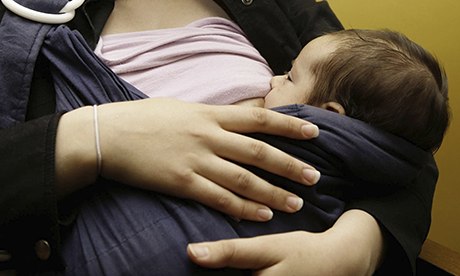
Joanna Moorhead describes our research as "the worst breastfeeding initiative I've ever come across", and denounces our research team – for which I am the principal investigator – with the cry, "shame on them" (When breast is worst, 13 November).
Well, we have no shame here about the intervention we're testing – financial incentives for mothers to breastfeed in areas with low 6-to-8 week breastfeeding rates. Though a new idea in Britain, financial incentives are given for six months in Quebec, Canada, where mums are paid $55 (£32.50) each month they breastfeed, and in India where breastfeeding mums are entitled to free food daily.
We have no shame about our methods. Over the last year our researchers have worked with mothers and healthcare professionals in Derbyshire and South Yorkshire. In a street survey, four out of five women thought it was a good idea to offer financial incentives. Women from areas with high breastfeeding rates were significantly more negative about the idea than those living in low breastfeeding areas (our target population).
Having gauged the local acceptability of the idea in principle with women, midwives and health visitors, last week we launched the second stage of our research, to test whether or not it is possible to offer shopping vouchers for breastfeeding. Despite the research being characterised by Moorhead as a "patronising, naive, ill-thought gesture", the first women eligible for the vouchers in Sheffield and Chesterfield are asking to join the scheme.
Moorhead states that our researchers "have decided to bribe women into doing something that 'they' have decided is best". Offering financial incentives to mothers is just one of a range of possible interventions that might help a shift from infant formula feeding to breastmilk feeding. Another possibility could be to consider putting infant formula on prescription, as recently begun in New York hospitals.
Our study is a peer-reviewed scientific study (funded by the National Prevention Research Initiative). In coming to a decision on vouchers, what will matter will be the views, experiences and behaviours of new mothers in areas with low breastfeeding rates, and the local healthcare professionals who support them. Only if it is feasible will we then begin the third stage – assessing the effectiveness and cost effectiveness of the scheme.
Moorhead says: "The motivation for breastfeeding does not vary according to whether you are rich or poor." Sadly, barriers to breastfeeding do vary according to where you live and to some extent how rich or poor you are. Our study is exploring the potential of one possible method of redressing this longstanding public health issue in British society.
If you wish to respond to an article in which you have featured, email response@theguardian.com. We cannot guarantee to publish all responses, and we reserve the right to edit

